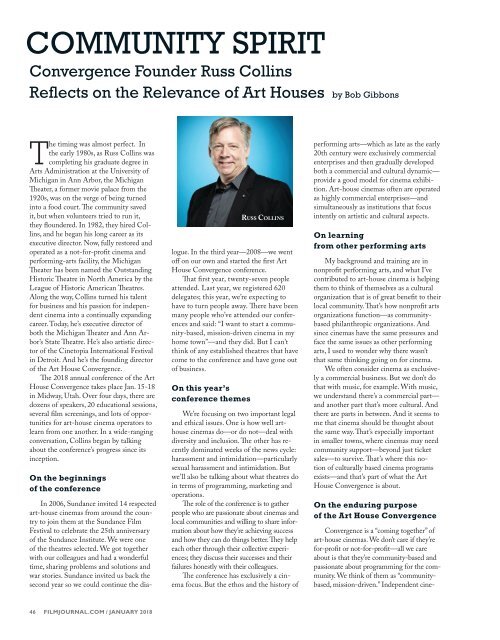Film Journal January 2018
- No tags were found...
You also want an ePaper? Increase the reach of your titles
YUMPU automatically turns print PDFs into web optimized ePapers that Google loves.
COMMUNITY SPIRIT<br />
Convergence Founder Russ Collins<br />
Reflects on the Relevance of Art Houses<br />
Convergence is a “coming together” of<br />
art-house cinemas. We don’t care if they’re<br />
for-profit or not-for-profit—all we care<br />
about is that they’re community-based and<br />
passionate about programming for the community.<br />
We think of them as “communitybased,<br />
mission-driven.” Independent cineby<br />
Bob Gibbons<br />
The timing was almost perfect. In<br />
the early 1980s, as Russ Collins was<br />
completing his graduate degree in<br />
Arts Administration at the University of<br />
Michigan in Ann Arbor, the Michigan<br />
Theater, a former movie palace from the<br />
1920s, was on the verge of being turned<br />
into a food court. The community saved<br />
it, but when volunteers tried to run it,<br />
they floundered. In 1982, they hired Collins,<br />
and he began his long career as its<br />
executive director. Now, fully restored and<br />
operated as a not-for-profit cinema and<br />
performing-arts facility, the Michigan<br />
Theater has been named the Outstanding<br />
Historic Theatre in North America by the<br />
League of Historic American Theatres.<br />
Along the way, Collins turned his talent<br />
for business and his passion for independent<br />
cinema into a continually expanding<br />
career. Today, he’s executive director of<br />
both the Michigan Theater and Ann Arbor’s<br />
State Theatre. He’s also artistic director<br />
of the Cinetopia International Festival<br />
in Detroit. And he’s the founding director<br />
of the Art House Convergence.<br />
The <strong>2018</strong> annual conference of the Art<br />
House Convergence takes place Jan. 15-18<br />
in Midway, Utah. Over four days, there are<br />
dozens of speakers, 20 educational sessions,<br />
several film screenings, and lots of opportunities<br />
for art-house cinema operators to<br />
learn from one another. In a wide-ranging<br />
conversation, Collins began by talking<br />
about the conference’s progress since its<br />
inception.<br />
On the beginnings<br />
of the conference<br />
In 2006, Sundance invited 14 respected<br />
art-house cinemas from around the country<br />
to join them at the Sundance <strong>Film</strong><br />
Festival to celebrate the 25th anniversary<br />
of the Sundance Institute. We were one<br />
of the theatres selected. We got together<br />
with our colleagues and had a wonderful<br />
time, sharing problems and solutions and<br />
war stories. Sundance invited us back the<br />
second year so we could continue the dialogue.<br />
In the third year—2008—we went<br />
off on our own and started the first Art<br />
House Convergence conference.<br />
That first year, twenty-seven people<br />
attended. Last year, we registered 620<br />
delegates; this year, we’re expecting to<br />
have to turn people away. There have been<br />
many people who’ve attended our conferences<br />
and said: “I want to start a community-based,<br />
mission-driven cinema in my<br />
home town”—and they did. But I can’t<br />
think of any established theatres that have<br />
come to the conference and have gone out<br />
of business.<br />
On this year’s<br />
conference themes<br />
Russ Collins<br />
We’re focusing on two important legal<br />
and ethical issues. One is how well arthouse<br />
cinemas do—or do not—deal with<br />
diversity and inclusion. The other has recently<br />
dominated weeks of the news cycle:<br />
harassment and intimidation—particularly<br />
sexual harassment and intimidation. But<br />
we’ll also be talking about what theatres do<br />
in terms of programming, marketing and<br />
operations.<br />
The role of the conference is to gather<br />
people who are passionate about cinemas and<br />
local communities and willing to share information<br />
about how they’re achieving success<br />
and how they can do things better. They help<br />
each other through their collective experiences;<br />
they discuss their successes and their<br />
failures honestly with their colleagues.<br />
The conference has exclusively a cinema<br />
focus. But the ethos and the history of<br />
performing arts—which as late as the early<br />
20th century were exclusively commercial<br />
enterprises and then gradually developed<br />
both a commercial and cultural dynamic—<br />
provide a good model for cinema exhibition.<br />
Art-house cinemas often are operated<br />
as highly commercial enterprises—and<br />
simultaneously as institutions that focus<br />
intently on artistic and cultural aspects.<br />
On learning<br />
from other performing arts<br />
My background and training are in<br />
nonprofit performing arts, and what I’ve<br />
contributed to art-house cinema is helping<br />
them to think of themselves as a cultural<br />
organization that is of great benefit to their<br />
local community. That’s how nonprofit arts<br />
organizations function—as communitybased<br />
philanthropic organizations. And<br />
since cinemas have the same pressures and<br />
face the same issues as other performing<br />
arts, I used to wonder why there wasn’t<br />
that same thinking going on for cinema.<br />
We often consider cinema as exclusively<br />
a commercial business. But we don’t do<br />
that with music, for example. With music,<br />
we understand there’s a commercial part—<br />
and another part that’s more cultural. And<br />
there are parts in between. And it seems to<br />
me that cinema should be thought about<br />
the same way. That’s especially important<br />
in smaller towns, where cinemas may need<br />
community support—beyond just ticket<br />
sales—to survive. That’s where this notion<br />
of culturally based cinema programs<br />
exists—and that’s part of what the Art<br />
House Convergence is about.<br />
On the enduring purpose<br />
of the Art House Convergence<br />
46 FILMJOURNAL.COM / JANUARY <strong>2018</strong><br />
016-057.indd 46<br />
12/19/17 2:14 PM

















